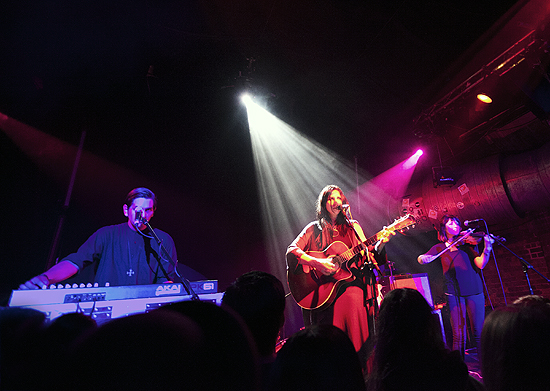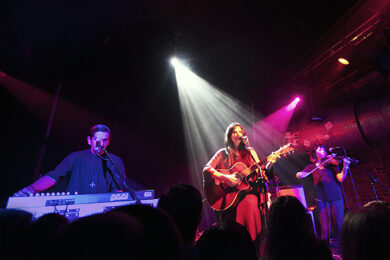After a few days of disarmingly sunny weather in London, stormy weather has returned suddenly. Charcoal skies are drawing in over East London, and a vicious wind arrows through the streets surrounding Cargo. Inside the Shoreditch venue’s converted railway arch space, the sound of opera builds slowly from a near-inaudible whisper and dry ice begins to creep across the candlelit stage. The venue begins to feel more like a crypt playing host to some kind of occult initiation than the trendy London nightspot that it had a mere hour earlier – even if they are still hawking San Miguel for £4.50 a can at the bar. Chatter inside is hushed, and an occasional faint rumbling overhead could almost represent something more sinister than the sound of Overground trains making the journey between Hoxton and Shoreditch High Street. An audience of around 250 people – what looks like a sell-out crowd – awaits the arrival of Californian drone-folk artist Chelsea Wolfe, who returns to London with a new album on the horizon and whose sense of theatre seems to have inspired the convergence of storms and nightfall outside.
Before the candles are lit and mist begins to drift across the stage, the suitably gloomy Peterborough-via-Brighton act The Wytches take to the stage and burst forth with a combination of tortured, dark psychedelia and even more tortured riffs that at times take inspiration from the early Cobain playbook, which in this context is more than OK. Frontman Kristian Bell peers from behind a veil of straggly black hair, his vocals a blend of unhinged Jack White evangelicalism and the cracked warble once employed by Davey MacManus of angst-ridden late 90s Welsh act The Crocketts. The Wytches display plenty of angst themselves tonight – more than they do poise. "You sit there and laugh while my dignity collapses," stutters Bell at one point, and poise, you sense, is not really the point.
Chelsea Wolfe doesn’t take to the stage with her face hidden by veils anymore, and her most recent release Unknown Rooms – a collection of fragile and strikingly pretty (if still often gloomy) acoustic tracks – demonstrated that her talents extend well beyond the doomy, black metal-inspired (but not black metal-aping) music that she had so far built her reputation on. In this sense, once Wolfe arrives the pre-show theatrics employed tonight initially seem quite misleading. Wolfe doesn’t ascend from beneath the stage in a fog of dry ice, there are no banshee like screams or horror film sound effects. Rather, the opera fades away and Wolfe shuffles onstage clutching an acoustic guitar and mumbles a greeting before strumming the first chords of ‘Appalachia’.
As with its studio counterpart, this acoustic segment places Wolfe’s songwriting – and her voice – centre-stage, bolstered only by a viola player on one flank and regular bandmate Ben Chisholm providing muted keyboard accompaniment on the other. There are few performers whose vocals can stun a room to enchanted silence like Wolfe’s, even if tonight the sense of intimacy is periodically broken by the inevitable, bobbing glow of smartphones (somewhere on YouTube, a five minute clip will show Wolfe onstage at Cargo, trying not to squint into the sustained, intrusive glare of the camera’s light while members of her audience turn around to see what is illuminating the head of the person in front of them). Still, a gently measured rendition of ‘Flatlands’ manages to take flight before a haunting ‘Boyfriend’ segues into a violin interlude, allowing Wolfe to leave the stage with the crowd gently primed in preparation for a main set that will itself barely be gentle at all.
September will see the release of Wolfe’s new album, her fourth release, and it is a new track, building into a torrent of stormy textures punctuated by a cacophonous Ben Chisholm bassline, that emphatically sets things in motion when the Californian returns with her full band. A scattering of new songs follow, but somewhat surprisingly Wolfe chooses to focus mainly on material from 2011’s Apokalypsis. For the most part, the older material is welcome: ‘Demons’ ups the pace and ‘Pale On Pale’ builds towards thunderous levels of dark and carefully textured intensity, while the mournful, pedal-looped vocals of ‘Movie Screen’ demonstrate that Wolfe is capable of crafting precise and fascinting textures even when largely unassisted by her bandmates.
The only problem with this focus on older material is that Wolfe’s set, including the acoustic section, only lasts an hour. While every song – new or old – is received enthusiastically by the crowd at Cargo, there is a sense of bewilderment accompanying the realisation that the night has come to an end by ten o’ clock, affording glimpses of only three or four new songs. This is a shame, because the new material on display is so good: a sophisticated barrage of synths, guitars and drums – with an occasional tumult of thunderous distorted bass – bisected by Wolfe’s diamond-cutter vocals.
Speaking before the show, Wolfe said that her new album will blend a heavier focus on electronics with "some rock ‘n’ roll" – that tag clearly representing something different to what most people would associate with it. Judging by the build from lone, sludgy guitar riff to near doom-metal cacophony of tonight’s encore track, it really will be some rock ‘n’ roll.
Until she leaves the stage tonight there is little sense that Wolfe is interested in holding anything back. One song, which doesn’t get an airing tonight, contains the lyric "When we fight, we fight like gods", which could be a metaphor for the titanic, sustained climaxes wrought by Wolfe and her band tonight. These moments, of which there are plenty, bode well for upcoming support slots with Swans and suggest that Stephen O’Malley can afford to feel very smug about his decision to add Wolfe to his stage at Poland’s OFF Festival in August. Crucially, the aural barrage never overwhelms Wolfe’s vocals, which remain the centrepiece – a counterpoint to doom and destruction that, at odds with her somewhat ghoulish onstage silhouette, veer between serenity, fragility and, occasionally, warmth. "We could be two straight lines in a crooked world," Wolfe sings on ‘Tracks (Tall Bodies)’, and it’s that human angle that keeps Wolfe’s music compelling, even at its most doom-laden. All of this bodes well for that new album – let’s just hope we’ll get to hear more of it next time she returns.



